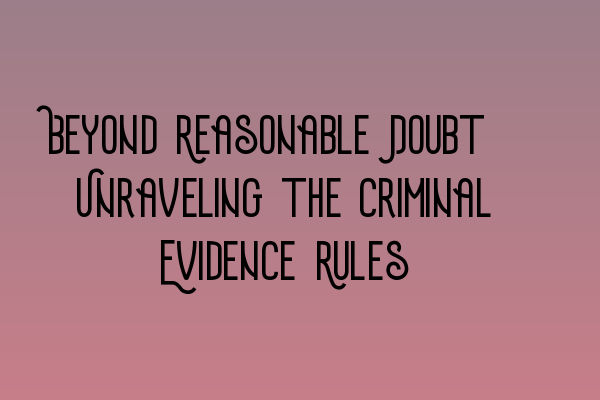Beyond Reasonable Doubt: Unraveling the Criminal Evidence Rules
Do you find yourself confused by the intricacies of criminal law and the application of evidence rules? Don’t worry; you’re not alone. Criminal law is a complex field that requires a solid understanding of the legal system and the burden of proof. In this article, we will delve into the concept of “beyond reasonable doubt” and explore its significance in the criminal justice system.
Understanding the Burden of Proof
In criminal cases, the burden of proof lies with the prosecution. The prosecution must prove the guilt of the defendant “beyond reasonable doubt”. This standard is set to ensure that an accused person is not wrongfully convicted. It is a high standard, and rightly so, as the consequences of a criminal conviction can be severe.
To establish guilt beyond reasonable doubt, the prosecution must present compelling evidence that leaves no reasonable doubt in the minds of the jurors. But what does “beyond reasonable doubt” actually mean? Let’s break it down.
The Meaning of “Beyond Reasonable Doubt”
The term “beyond reasonable doubt” is often misunderstood. It does not require absolute certainty or mathematical proof. Rather, it means that based on the evidence presented, a reasonable person would have no substantial doubt about the defendant’s guilt.
Reasonable doubt is not an imaginary or fanciful doubt. It is a doubt that arises from a fair and impartial consideration of all the evidence in the case. It is an honest and logical doubt that can be explained, rather than an arbitrary or irrational doubt.
In practical terms, the prosecution must prove its case to the extent that no reasonable person could conclude that the defendant is innocent. It is not enough for the evidence to merely point towards guilt; it must establish guilt beyond any reasonable doubt.
The Importance of Adhering to the Standard
Adhering to the “beyond reasonable doubt” standard is crucial to maintaining the integrity and fairness of the criminal justice system. It ensures that innocent individuals are not wrongly convicted and helps prevent miscarriages of justice.
The burden of proving guilt beyond reasonable doubt serves as a safeguard against arbitrary or unsupported convictions. It requires the prosecution to present a strong and convincing case, backed by reliable evidence, to secure a conviction.
If there is any reasonable doubt about a defendant’s guilt, the jury must acquit. This principle reflects the fundamental tenet of criminal law that it is better to let a guilty person go free than to convict an innocent one.
Conclusion
Understanding the concept of “beyond reasonable doubt” is essential for anyone involved in the criminal justice system, be it lawyers, jurors, or defendants. It is a legal standard designed to protect the rights of the accused and ensure a fair trial.
If you are studying for the SQE exams, it is crucial to have a solid grasp of criminal law and evidence rules. To enhance your preparation, check out our SQE 1 Practice Exam Questions and SQE 1 Practice Mocks FLK1 FLK2. We also offer comprehensive SQE 2 Preparation Courses and SQE 1 Preparation Courses to help you succeed in your exams. Stay updated with the latest SRA SQE Exam Dates and join us on the path to becoming a skilled solicitor.
